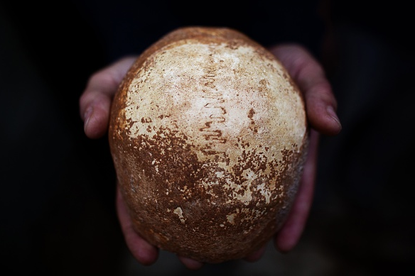Ancient Israeli skull sheds new light on human evolution


Scientists have discovered the first fossil that appears to document human migration out of Africa and to Europe, by way of the Middle East. An Israeli skull that's roughly 55,000 years old was found in northern Israel's Manot Cave in the Galilee region.
The earliest remains of modern humans in Europe date to 45,000 years ago, according to The Associated Press. The newly discovered skull resembles ancient skulls found in Europe. Previously, scientists didn't have fossil evidence that "fits so well with what was believed about the ancient migration," AP notes. The fossil shows that modern humans in the Middle East "already had physical traits a bit different from other Africans they were leaving behind," The New York Times reports.
Iframe Code
Subscribe to The Week
Escape your echo chamber. Get the facts behind the news, plus analysis from multiple perspectives.

Sign up for The Week's Free Newsletters
From our morning news briefing to a weekly Good News Newsletter, get the best of The Week delivered directly to your inbox.
From our morning news briefing to a weekly Good News Newsletter, get the best of The Week delivered directly to your inbox.
The skull also suggests that early humans interbred with Neanderthals, according to the researchers. Neanderthals were already known to live in the area at the time, so the skull documents the coexistence of Neanderthals and modern humans in the region. Experts note that the skull dates to the estimated time of the interbreeding, which is thought to have taken place between 50,000 and 60,000 years ago.
Create an account with the same email registered to your subscription to unlock access.
Sign up for Today's Best Articles in your inbox
A free daily email with the biggest news stories of the day – and the best features from TheWeek.com
Meghan DeMaria is a staff writer at TheWeek.com. She has previously worked for USA Today and Marie Claire.
-
 'Good riddance to the televised presidential debate'
'Good riddance to the televised presidential debate'Instant Opinion Opinion, comment and editorials of the day
By Harold Maass, The Week US Published
-
 Caitlin Clark the No. 1 pick in bullish WNBA Draft
Caitlin Clark the No. 1 pick in bullish WNBA DraftSpeed Read As expected, she went to the Indiana Fever
By Peter Weber, The Week US Published
-
 Today's political cartoons - April 16, 2024
Today's political cartoons - April 16, 2024Cartoons Tuesday's cartoons - sleepyhead, little people, and more
By The Week US Published
-
 Puffed rice and yoga: inside the collapsed tunnel where Indian workers await rescue
Puffed rice and yoga: inside the collapsed tunnel where Indian workers await rescueSpeed Read Workers trapped in collapsed tunnel are suffering from dysentery and anxiety over their rescue
By Sorcha Bradley, The Week UK Published
-
 More than 2,000 dead following massive earthquake in Morocco
More than 2,000 dead following massive earthquake in MoroccoSpeed Read
By Justin Klawans Published
-
 Mexico's next president will almost certainly be its 1st female president
Mexico's next president will almost certainly be its 1st female presidentSpeed Read
By Peter Weber Published
-
 North Korea's Kim to visit Putin in eastern Russia to discuss arms sales for Ukraine war, U.S. says
North Korea's Kim to visit Putin in eastern Russia to discuss arms sales for Ukraine war, U.S. saysSpeed Read
By Peter Weber Published
-
 Gabon's military leader sworn in following coup in latest African uprising
Gabon's military leader sworn in following coup in latest African uprisingSpeed Read
By Justin Klawans Published
-
 Nobody seems surprised Wagner's Prigozhin died under suspicious circumstances
Nobody seems surprised Wagner's Prigozhin died under suspicious circumstancesSpeed Read
By Peter Weber Published
-
 Western mountain climbers allegedly left Pakistani porter to die on K2
Western mountain climbers allegedly left Pakistani porter to die on K2Speed Read
By Justin Klawans Published
-
 'Circular saw blades' divide controversial Rio Grande buoys installed by Texas governor
'Circular saw blades' divide controversial Rio Grande buoys installed by Texas governorSpeed Read
By Peter Weber Published